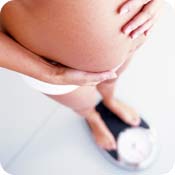 First thing to do is relax! This is not that big of a deal in the grand scheme of things when it comes to your pregnancy. But there are some potential problems with gaining too much weight you should be aware of. The excess can result in extra backaches, leg pain, increased fatigue, and varicose veins. The baby may also become too large for a safe vaginal delivery. There is also an increased risk of postoperative complications and of course, the excess weight is harder for you to shed.
First thing to do is relax! This is not that big of a deal in the grand scheme of things when it comes to your pregnancy. But there are some potential problems with gaining too much weight you should be aware of. The excess can result in extra backaches, leg pain, increased fatigue, and varicose veins. The baby may also become too large for a safe vaginal delivery. There is also an increased risk of postoperative complications and of course, the excess weight is harder for you to shed. You are wise to be proactive and you CAN get back on track. The important thing is this is NOT the time to start a crash diet. Crash diets are not good for you and can harm the baby. It is a good time to analyze your diet and fitness program and set some healthy goals for the rest of your pregnancy. This will get you back on track. Check Your Nutrition First, take at good look at your eating habits and try to locate the problem areas. Do you overindulge in sweets, cake, cookies, pie, and pastries? Are you turning to high-fat, fried foods for comfort? Are you caught in the eating-for-two myth? Once you have analyzed your diet, decide where you want to make the changes. Remember you need to meet these daily minimum servings:
Exercise is an important component of any fitness program but it is mandatory that you check with your doctor about starting a fitness program during pregnancy. This is especially important if you were not very active prior to your pregnancy. Two moderate exercise activities to consider are walking and swimming. Particularly swimming, because it takes the extra weight off your joints and back. Remember that fitness during pregnancy is not for weight loss but will help with muscle tone, appetite control, and mental health. In addition to helping avoid excessive weight gain, well-toned muscles will:
The acceptable average pregnancy weight gain for someone of normal weight is 25-35 pounds. During the second and third trimester, the average weekly weight gain fluctuates between 1/2 pound each week to 1 1/2 pounds each week. If you try to have an average weekly weight gain of 2/3 to 3/4 pound, plus the 15 pounds you gained during the first trimester, your total weight gain will be approximately 33-35 pounds. VOILA! You are right in the healthy weight range. Plus your body is in better condition and you've provided yourself and your baby with all the necessary nutrients. Don't give up! You can do it for yourself and your baby! |
"I Gained Fifteen Pounds in my First Trimester!"
What You Can Do About It
Page 1 of 1






Member Comments
The doctor did explain that some of it is genetic, and the good news is that I was back to my pre-baby weight after about 3 years. It took a while, but I got there! I now have a healthy, happy family & we're all within our healthy weight ranges. Report